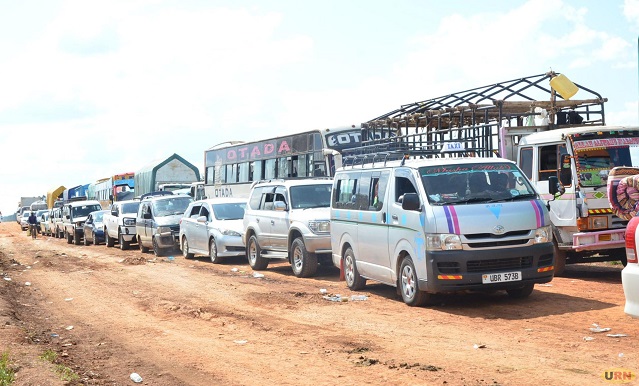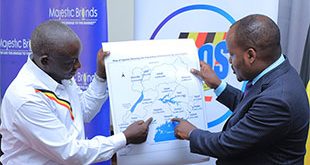
Kiryandongo, Uganda | THE INDEPENDENT | Travelers, traders, and motorists accessing Northern Uganda through the Masindi port have decried congestion at the ferry crossing point in both Kiryandongo and Apac districts. Following the closure of the Karuma Bridge in September that links Midwestern, Northern Uganda, and West Nile Sub-regions, the government guided that people intending to access Northern Uganda should use alternative routes, including the Masindi Port route via Apac district.
However, those accessing Northern Uganda through the Masindi Port ferry and those accessing the Bunyoro sub-region from the same ferry crossing point have decried congestion, delays, and increased transport costs. Currently, the government has deployed two ferries at the Masindi Port to aid the movements of people, especially those connecting to Northern Uganda and those coming to the Bunyoro sub-region.
Several vehicles are parked for long hours at the ferry crossing points on both the Apac side and the Kiryandongo side as they wait to board the ferries, which have limited capacity to carry many vehicles and passengers at once. One of the ferry operators who spoke to Uganda Radio Network (URN) on condition of anonymity explained that, daily, the two ferries carry more than 400 vehicles following the closure of the Karuma bridge.
The source said the MV Masindi port ferry only carries 10 small vehicles, like double cabin pickup trucks and taxis, and about 120 passengers per route, adding that with the current traffic flow, most passengers and vehicles are being left out, and many spend a night at the ferry crossing points.
He says they are compelled to release vehicles and passengers in small numbers to avoid congestion on the ferry. John Omara from Gulu, who was traveling to Kampala and was found at the Masindi port ferry crossing point, says he spent 5 hours before crossing to the Kiryandongo side due to the huge number of vehicles.
Francis Twinomujuni, who was heading to Kampala from South Sudan, states that he spent a night at the ferry crossing point due to congestion of vehicles and passengers. He states that currently, the transport cost from Elegu border point to Kampala has risen from shillings 80,000 to 100,000, which he says is a result of the closure of the Karuma bridge and the long route they are compelled to use.
Justine Ayo, who was crossing from Masindi to Apac district, noted that she spent 8 hours before crossing to the Apac side. She appeals to the government to allocate more ferries to ease movements and avoid congestion.
Fred Semaka, who was heading to Juba from Kampala through the Masindi port ferry, explains that the journey has extremely become difficult and expensive.
He explains that they are spending a lot of time unlike in the past when they were using the Karuma bridge to connect to Northern Uganda and Juba.
Edith Aliguma, the Kiryandongo LC5 Chairperson, explains that the government needs to expedite the process of deploying bigger ferries to reduce the congestion at Masindi port.
She says currently people spend long hours as they wait for the ferries to cross over to both sides. This, she says, has inconvenienced travelers and their businesses.
Gilbert Olara, a resident of Masindi Port sub-county in Kiryandongo, states that the current ferries deployed at the Masindi Port are too small to accommodate the huge number of passengers and vehicles, appealing to the government to deploy more bigger ferries to ease movements to and from Northern Uganda.
Julius Hakiza, the Albertine region police spokesperson, says that following the traffic flow in the region due to the closure of the Karuma bridge, traffic police has maintained a heavy presence on all the roads in Bunyoro to ensure comprehensive traffic management, stating that the number of vehicles has greatly increased.
The government on September 17th announced the total closure of Karuma Bridge to all traffic for the next three months.
The announcement was made by Gen. Edward Katumba Wamala, the transport minister, while inspecting the progress of the repair works of the bridge currently being undertaken by the Chinese firm China Railway Seventh Group and National Enterprise Corporation (NEC).
Karuma Bridge was temporarily closed in April this year after engineers found crucial components of the bridge, including the bearings and expansion joints, had worn out and developed cracks.
Katumba then stated that the decision to permanently close the bridge will allow the contractor and team of engineers on-site to handle repairs conveniently.
He says that following further inspection of the bridge, it was found prudent that not only the worn-out sections and cracks be rehabilitated, but an entire bridge deck is replaced to guarantee the safety of motorists.
According to Gen. Katumba, the rehabilitation works will also see new safety features, such as much stronger guard rails installed and the provision of better lighting at night.
Karuma Bridge is a crucial link and gateway between Midwestern, Northern Uganda, and West Nile Sub-regions, but has outlived its life span since its construction in 1962.
With the closure of the bridge, motorists and passengers intending to travel to and outside Northern Uganda and West Nile sub-regions will use the Murchison Falls National Park route, the eastern route through Lango Sub-region, and the Masindi Port.
*******
URN
 The Independent Uganda: You get the Truth we Pay the Price
The Independent Uganda: You get the Truth we Pay the Price



